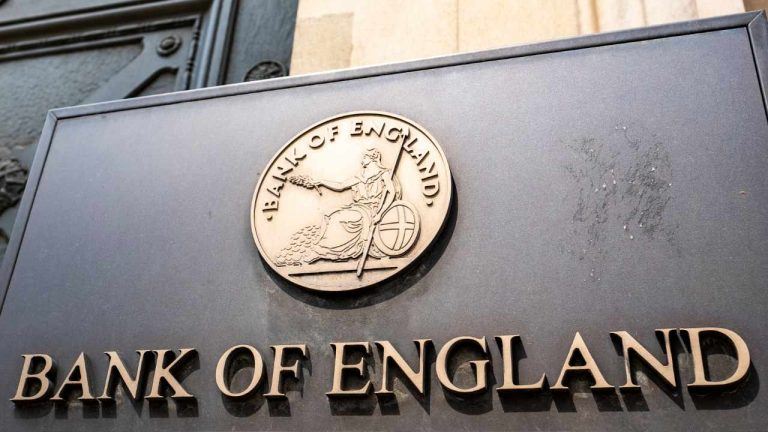
One of the oldest central banks in England is giving companies until March 2025 to disclose their exposure to digital assets. In a new announcement, The Bank of England says that the Prudential Regulation Authority (PRA) – the UK’s financial regulator – is looking to gather data on firms’ current and future exposure to crypto […]
The post One of England’s Oldest Central Banks Gives Firms Till March 2025 To Disclose Crypto Exposure appeared first on The Daily Hodl.

It comes a day after a UK government bill aimed to clarify that crypto was “personal property” under property laws.
A United Kingdom High Court has ruled that stablecoin Tether is property — the first-ever ruling under English law on the treatment and status of cryptocurrency after a full trial.
The legal status of Tether (USDT) was a preliminary issue in a case brought by a fraud victim whose stolen crypto — including Tether — was offloaded through various crypto exchanges after being put through crypto mixers.
“USDT attract property rights under English law,” High Court of Justice Deputy Judge Richard Farnhill said in the Sept. 12 ruling.
 The Bank of England (BOE) is urging UK banks to expedite their digital payment solutions as cash use declines. The BOE’s recent paper highlights the need for innovations that allow direct payments from bank accounts, bypassing credit and debit cards, to save time and costs for consumers and retailers. The British central bank is developing […]
The Bank of England (BOE) is urging UK banks to expedite their digital payment solutions as cash use declines. The BOE’s recent paper highlights the need for innovations that allow direct payments from bank accounts, bypassing credit and debit cards, to save time and costs for consumers and retailers. The British central bank is developing […]
13-year-old Blake Cockram founded CryptoKicks last year, and now he is teaching sneakerheads in the U.K. about all things crypto.
Footwear has long been a critical element of culture and fashion worldwide. For some, shoes exist only to protect one’s feet from the elements; but for others, they are the most critical part of a wardrobe. Sneakers, in particular, have developed a cult following, with some ultra-rare pairs selling for tens of thousands of dollars.
An entire industry has developed around sneaker culture, ranging from the shoe manufacturers and retailers themselves to the influencers who help drive the culture. And as Web3 becomes more mainstream, big sneaker brands like Nike are dipping their toes into nonfungible tokens (NFTs) and the metaverse, while play-to-earn projects like StepN have also experimented with tokenizing shoes.
One particularly active group is resellers, who purchase just released, high-demand shoes and resell them to eager buyers who missed out on the original drop. CryptoKicks, a United Kingdom-based shoe resale business founded by 13-year-old Blake Cockram, is taking this business model and adding a fresh Web3 spin to it — anyone who buys a pair of sneakers with crypto gets 10% off their order.
On Episode 22 of The Agenda, hosts Jonathan DeYoung and Ray Salmond chat with Blake to learn what it’s like being a teenage entrepreneur and how CryptoKicks’ crypto-centric business model is helping onboard new users into the blockchain space.

“We accept crypto as a payment,” Blake explained. “You can pay in whatever you want, but we’ve got a thing going, and if you pay in crypto, you get 10% off any trainer.” According to the young entrepreneur, this proves an enticing offer for many, especially when in-demand sneakers on the secondary market can cost hundreds of dollars.
“People think, ‘Oh wow, that sounds quite good. May as well get some crypto and get some cheaper Jordans.’”
CryptoKicks accepts Bitcoin (BTC), Ether (ETH) and stablecoins like Tether (USDT). According to Blake, most customers who purchase sneakers with crypto are brand new to blockchain. “‘I’ve probably only had about one or two people who were already into crypto, but everyone else has kind of been new to it, and we’ve got them into it,” he told co-hosts Jonathan DeYoung and Ray Salmond. So, in addition to getting a pretty sweet discount, Blake’s customers also learn how cryptocurrencies like Bitcoin work and how to take greater control over their assets.
“We’ve walked a couple people through it, like download this app, make your wallet, that it might take 24 hours to confirm you, because it normally does. And you just tell them how to go through it. And a couple people have asked us, ‘What’s the best coin for me to pay you in? What would I make money off in the future?’ and stuff like that.”
Blake, himself, was orange-pilled by his older brother. “He’s into crypto a lot, and he’s like, ‘We could do something crazy here. ‘You start your company and put crypto in the name, and people are going to go crazy for it.’ And we’ve done it, and it’s worked out pretty good.”
At 13 years old, Blake is still in school, where the opinions of other students are mixed when it comes to crypto. “People ask me, like, ‘What is crypto?’ Because not many people actually know about it,” he explained. “And then you’ve got some people who do know about it, and they’re like, ‘It’s a good thing.’ But I’ve also got some people who are like, ‘Oh, I don’t believe in crypto. It’s a load of rubbish.’”
But Blake is doing his best to spread awareness among his classmates:
“I just say like, ‘I think crypto is good.’ Like it’s a new way of payment [that] not a lot of people know about. You can get money instant, and it’s like good fun as well, having a bit of crypto, sending it around, that stuff.”
To hear more from Blake’s conversation with The Agenda, including his insights on sneaker culture in the U.K. and his plans for his future, listen to the full episode on Cointelegraph’s Podcasts page, Apple Podcasts or Spotify. And don’t forget to check out Cointelegraph’s full lineup of other shows!
Magazine: 6 Questions for Leila Ismailova: Digital fashion and life after Artisant
This article is for general information purposes and is not intended to be and should not be taken as legal or investment advice. The views, thoughts, and opinions expressed here are the author’s alone and do not necessarily reflect or represent the views and opinions of Cointelegraph.

Binance has drawn attention for using a small building as its registered office in the UK, but tech firms have used a similar trick for years.
The United Kingdom-registered address for an entity of one of the world’s largest crypto exchanges, Binance, is nothing but a tiny building in Britain’s east that is shared by thousands of other companies.
On June 19, a post on the r/buttcoin subreddit showed the so-called “utility closet” Binance Ltd and thousands of other firms use as a registered office address in the U.K. — a tactic often used by other tech firms and large companies.
Binance Ltd’s address points to the small town of Mildenhall in Suffolk county, England. Google Maps shows the site is a small, nondescript garage building on the outer edge of the town about an hour and a half's drive from Britain’s capital London.

Companies House — the government's company’s registrar — shows Binance Ltd shares the address with 2,403 active companies in total.
The address is actually the site of a company called OfficeServ, a virtual registered address service provider that aims to give a “believable business location,” as per its website.
Companies House shows Binance Ltd is registered to provide ”other service activities not elsewhere classified.” Binance has around six entities in Britain across various addresses registered to provide IT and financial services.
Related: Binance cancels registration for inactive business in the UK
Cointelegraph contacted Binance for more information on the entity but did not immediately receive a response.
Technology companies have employed such virtual “shell” addresses around the world and in the United States for years. These are used for a host of reasons — from providing privacy, obscuring patent filings or registering a business in a corporate tax haven.
Most notable is the Corporation Trust Company, the world’s largest registered agent service firm, used by thousands of firms, including well-known companies such as Google, Walmart, Coca-Cola and Apple. It operates out of a similarly nondescript brick building in Delaware.
This utterly nondescript building in Wilmington, Delaware is (probably) the most famous address in corporate law.
— Lucius Winslow (@Lucius_Winslow) November 15, 2020
1209 North Orange Street.
It houses the Corporation Trust Center, the registered agent address of about three hundred thousand businesses. Including some giants. pic.twitter.com/HhdaUfKXCU
The firm was used by Apple last November in an attempt to obscure the patent fillings for its recently announced Vision Pro headset and related operating system.
Another firm, Wyoming Corporate Services, was described in a 2011 Reuters exposé as a “brick house” in a “sleepy city” and home to 2,000 registered companies at the time.
Magazine: Peter McCormack’s Real Bedford Football Club puts Bitcoin on the map

The bank requires the wallet to execute basic features such as transacting value and requesting payments and set its budget at nearly $255,000.
The Bank of England (BOE) is seeking a “proof of concept” for a wallet that will be able to hold a Central Bank Digital Currency (CBDC).
On Dec. 9, the BOE posted a request for applications on the United Kingdom government's Digital Marketplace, a service where government organizations can solicit work for digital projects.
Simple guidelines for what the proof-of-concept wallet would have to achieve were outlined, with the wallet seemingly only needing to offer basic functionality such as a signup process, a way to update details, and show balances and transactions amongst other requirements such as displaying notifications.
Of course, the wallet also has to demonstrate it can be loaded and unloaded with a CBDC along with being able to request peer-to-peer payments through an account ID or QR code and can be used to pay online with businesses.
Key deliverables for the project are to create a mobile app for iOS and Android, a website for the wallet, an example merchant website and the back-end infrastructure to serve the wallet website and apps while also storing user data and transaction history.
“No work has been done” on a CBDC sample wallet the bank said, and it “will not develop a user wallet itself.”
The stated aims of the project are to “explore the end-to-end user journey” as the BOE seeks to “sharpen functional requirements for both the Bank and private sector” along with making the CBDC product “more tangible for internal and external stakeholders.”
A budget of $244,500, or 200,000 British pounds, for an expected five-month project was set for the proof-of-concept with the BOE slated to evaluate five suppliers. There were no applications at the time of writing.
Related: Spain’s central bank to experiment with wholesale CBDCs
The BOE has previously stated it is seeking to launch a CBDC by at least 2030.
The sample wallet is supportive of the BOE’s work as part of Project Rosalind, a joint experiment it’s carrying out with the Bank of International Settlements (BIS) Innovation Hub aimed at creating prototypes of an application programming interface (API) for a CBDC. The proof-of-concept wallet will also be test implemented with the Rosalind API.
On Dec. 9, the Chancellor of the Exchequer, Jeremy Hunt, shared a number of reforms to Britain’s financial services sector which included consulting on proposals for the establishment of a CBDC.
 Bitbase, a Spanish cryptocurrency ATM company, is planning to keep expanding its services in 2023. The company, which received investments from Dextools and Woonkly, two Web3-based decentralized companies, aims to reach 200 cryptocurrency ATMs installed in Spain. Bitbase is also working to obtain licenses to begin operating in countries like Italy, England, Germany, and the […]
Bitbase, a Spanish cryptocurrency ATM company, is planning to keep expanding its services in 2023. The company, which received investments from Dextools and Woonkly, two Web3-based decentralized companies, aims to reach 200 cryptocurrency ATMs installed in Spain. Bitbase is also working to obtain licenses to begin operating in countries like Italy, England, Germany, and the […]
Traders expect an uptick in volatility due to the possibility of September’s $2.2 billion options expiry putting pressure on BTC price near a critical support level.
This week the $20,000 resistance is proving to be stronger than expected and even after Bitcoin price rejected at this level on Sept. 27, BTC bulls still have reasons to not give up.
According to the 4-month-long descending triangle, as long as the $18,500 support holds, Bitcoin price has until late October to determine whether the downtrend will continue.

Bitcoin bulls might have been disappointed by the lackluster price performance as BTC has failed multiple times to break above $20,000, but macroeconomic events might trigger a rally sooner than expected.
Some analysts point to the United Kingdom's unexpected intervention in the bond market as the breaking point of the government’s debt credibility. On Sept. 28, the Bank of England announced that it would begin the temporary purchase of long-dated bonds to calm investors after a sharp yield increase, the highest since 1957.
To justify the intervention, the Bank of England stated, "were dysfunction in this market to continue or worsen, there would be a material risk to U.K. financial stability." Taking this measure is diametrically opposite to the promise of selling $85 billion in bond holdings within 12 months. In short, the government's credibility is being questioned and as a result investors are demanding much higher returns to hold U.K. debt.
The impact of the government's efforts to curb inflation are beginning to impair corporate revenues and according to Bloomberg, Apple recently backed off plans to increase production on Sept. 27. Amazon, the world's biggest retailer, is also estimated to have shuttered plans to open 42 facilities, as per MWPVL International Inc.
That is why the $2.2 billion Bitcoin (BTC) monthly options expiry on Sept. 30 will put a lot of price pressure on the bulls, even though bears seem slightly better positioned as Bitcoin attempts to hold on to $19,000.
Bitcoin's rally toward the $22,500 resistance on Sept. 12 gave the bulls the signal to expect a continuation of the uptrend. This becomes evident because only 15% of the call (buy) options for Sept. 30 have been placed at $21,000 or lower. This means Bitcoin bears are better positioned for the expiry of the $2.2 billion in monthly options.

A broader view using the 1.49 call-to-put ratio shows a skewed situation with bullish bets (calls) open interest at $1.26 billion versus the $850 million put (sell) options. Nevertheless, as Bitcoin currently stands near $19,000 and bears have a dominant position.
If Bitcoin price remains below $20,000 at 8:00 am UTC on Sept. 30, only $37 million worth of these call (buy) options will be available. This difference happens because there is no use in the right to buy Bitcoin at $20,000 or $21,000 if it trades below that level on expiry.
Below are the four most likely scenarios based on the current price action. The number of options contracts available on Sept. 30 for call (bull) and put (bear) instruments varies, depending on the expiry price. The imbalance favoring each side constitutes the theoretical profit:
This crude estimate considers the call options used in bullish bets and the put options exclusively in neutral-to-bearish trades. Even so, this oversimplification disregards more complex investment strategies.
Bitcoin bulls need to push the price above $21,000 on Sept. 30 to balance the scales and avoid a potential $350 million loss. However, Bitcoin bulls seem out of luck since the U.S. Federal Reserve chairman called for "crypto activities" regulation on Sept. 27, alerting "very significant structural issues around the lack of transparency."
If bears dominate the September monthly options expiry, that will likely add firepower for further bets on the downside for Bitcoin price. But, at the moment, there is no indication that bulls can turn the tables and avoid the pressure from the 4-month-long descending triangle.
The views and opinions expressed here are solely those of the author and do not necessarily reflect the views of Cointelegraph.com. Every investment and trading move involves risk, you should conduct your own research when making a decision.

The creators of a popular crypto asset designed to keep a US dollar peg now plan to expand their roster into the United Kingdom. In a new announcement, Tether says it will work with UK authorities to create a new digital asset called GBPT that will seek 1-to-1 parity with the Pound Sterling. GBPT will […]
The post Tether To Work With UK Regulators for Launch of New Stablecoin Pegged to British Pound appeared first on The Daily Hodl.